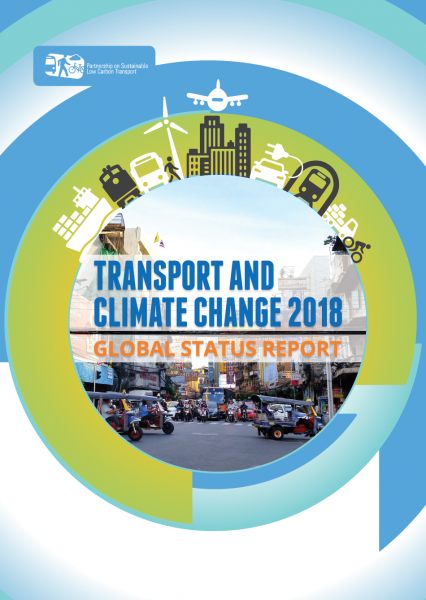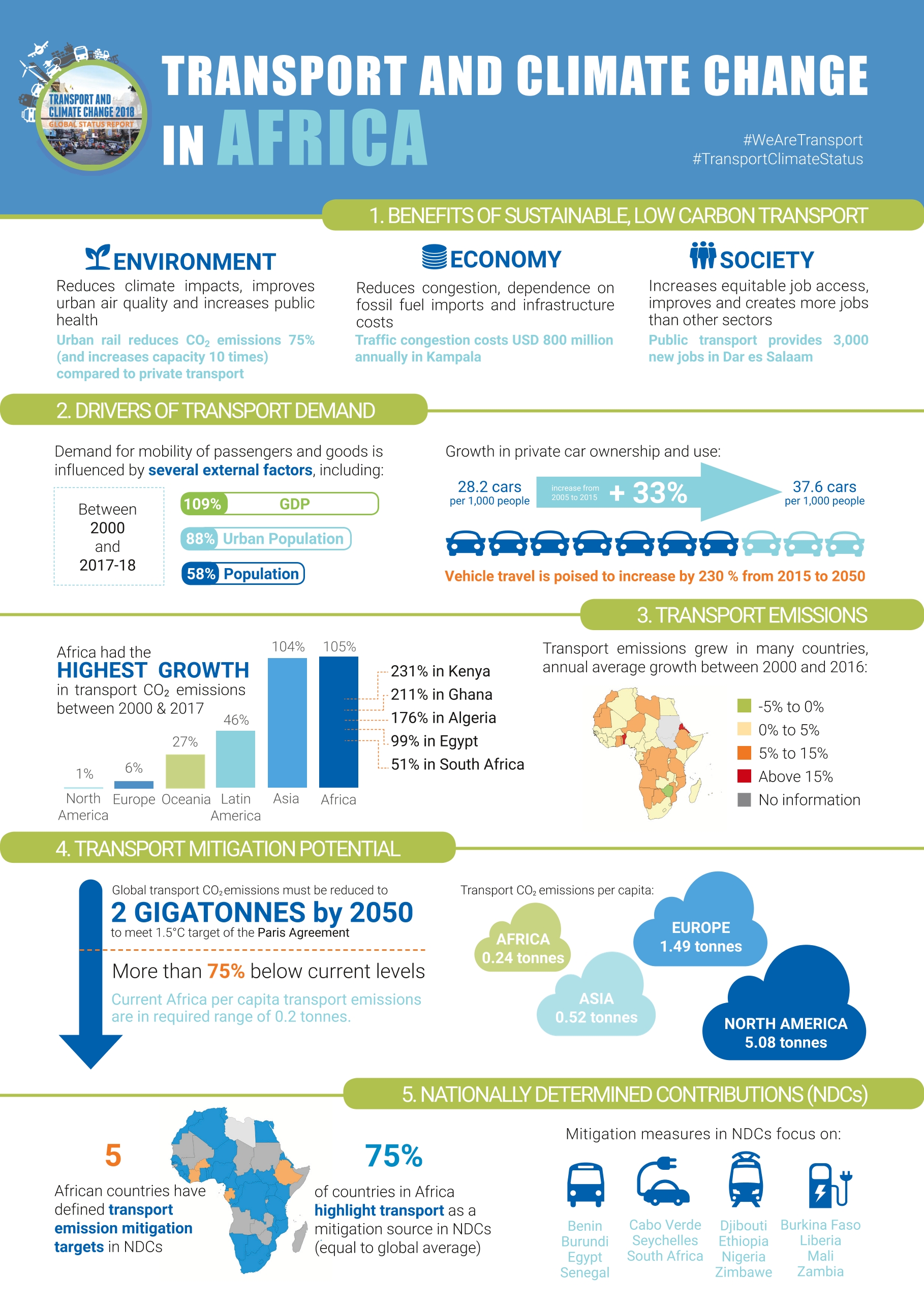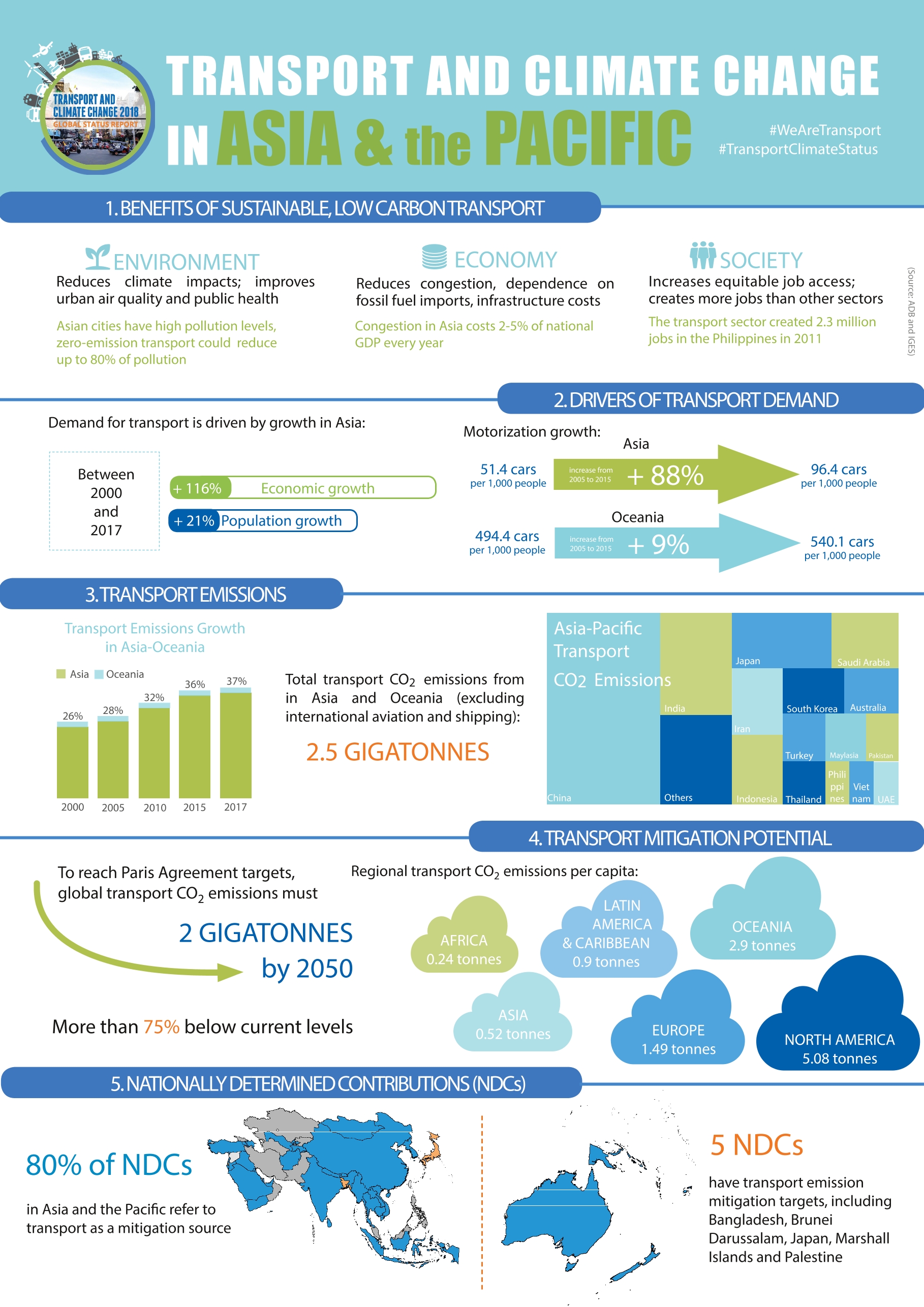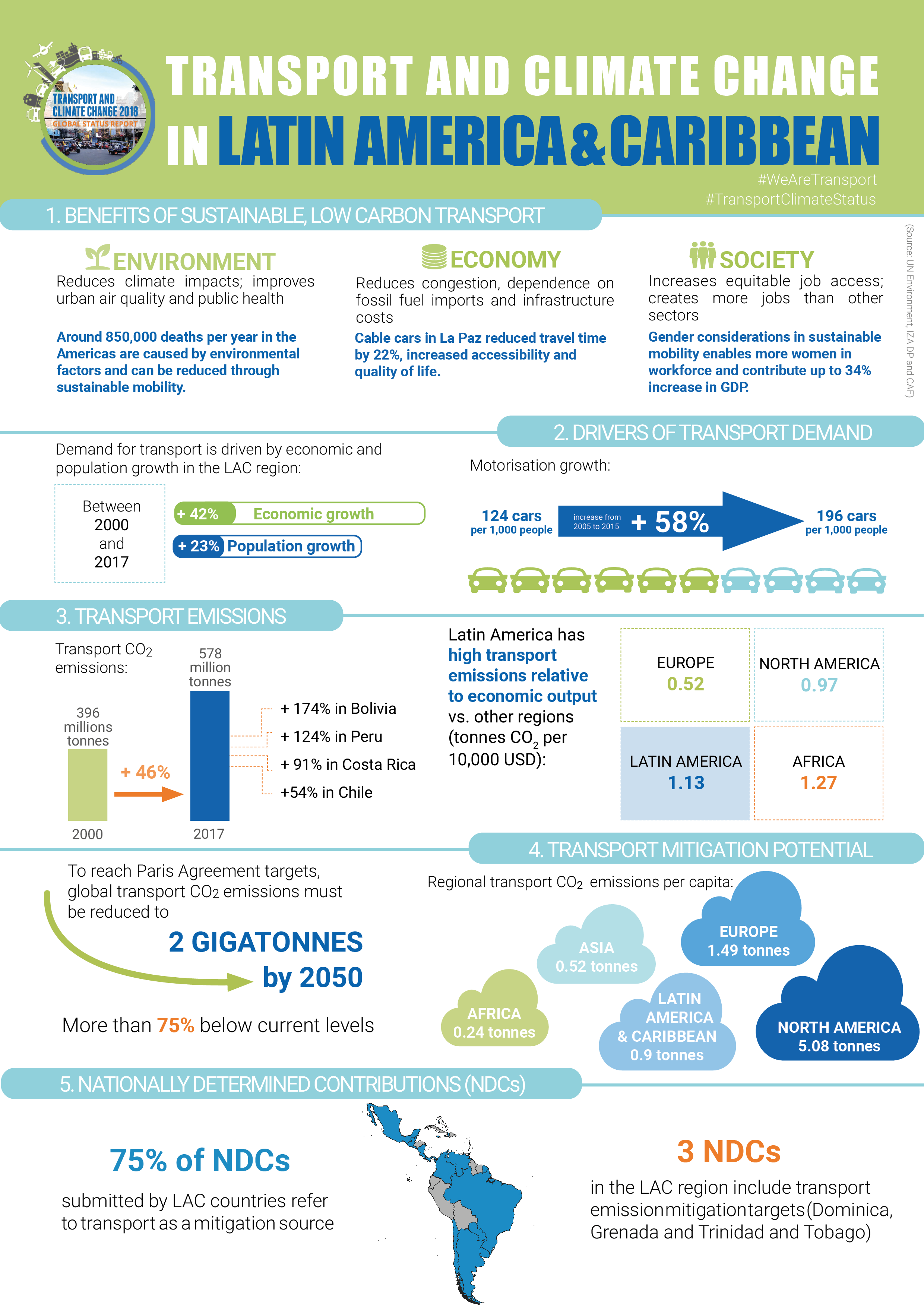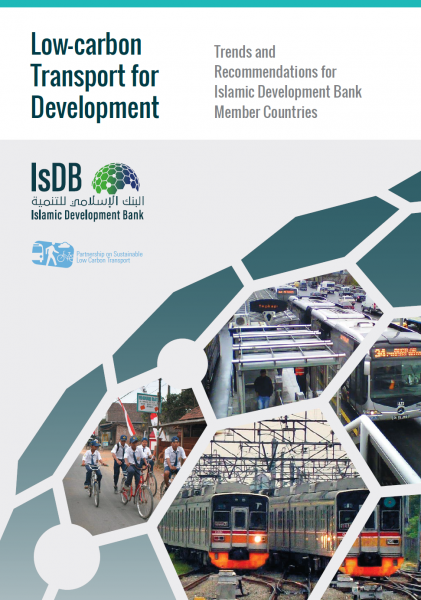Transport and Climate Change
Transport and Climate Change 2018 Global Status Report (TCC-GSR)
The Transport and Climate Change 2018 Global Status Report (TCC-GSR) describes trends in transport emissions and illustrates policies as well as policy targets across all transport sub-sectors. It sets a baseline that helps to capture the progress of transport in regard to climate action. The TCC-GSR is a key resource for policy-makers to support raising ambition on climate action (mitigation and adaptation) in sustainable transport.
Read the TCC-GSR here.
TCC-GSR regional infographics
Based on the findings of the TCC-GSR, SLoCaT developed three regional infographics. They show the trends and activities on sustainable transport in Africa, Asia and Latin America.
Sustainable Transport: A Critical Driver to Achieve the Sustainable Development Goals
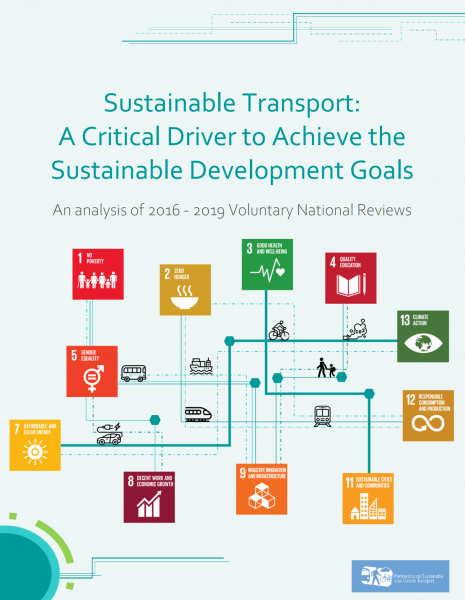
The SLoCaT Partnership has released the report, ‘Sustainable Transport: A Critical Driver to Achieve the Sustainable Development Goals,’ to summarise how transport has been reflected in the first quadrennial VNR reporting cycle from 2016 – 2019. While during the first quadrennial reporting cycle from 2016 to 2019, 92% of the submitted VNRs have highlighted progress made in the transport sector, only 30% of VNRs have included explicit references to transport sustainability impacts.
Find the report here.
Low Carbon Transport for Development in IsDB Countries
The Islamic Development Bank (IsDB) and the SLoCaT Partnership developed an analysis on low carbon transport in IsDB member countries outlining major challenges and needs, potential transport policy activities and areas of required action.
Read the report here.
Transport, Climate Action and Sustainable Development: Synergies Across NDCs and VNRs in IsDB Member Countries
The transport sector has a critical role to play in achieving climate change mitigation targets and Sustainable Development Goals (SDGs), and the Paris Agreement on Climate Change and the 2030 Agenda for Sustainable Development provide a useful framework to help scale up sustainable transport measures. However, further alignment between these global processes is required to raise ambition and measure progress to realise the full potential of sustainable low-carbon transport in achieving these goals.The report links mechanisms in the climate change and sustainable development frameworks with the objective to identify synergies for the development, implementation and reporting on sustainable transport for IsDB member countries.
The report is planned to be released in January 2020.
E-Mobility Trends and Targets
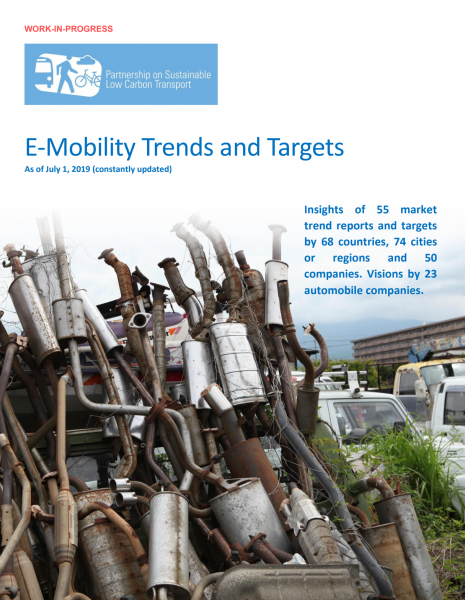
This document compilesinformation onthe development of electric mobility with regard to market trend reports;official targetsby countries, cities, and companies; and industry plans.This document is a work-in-progress and will be expanded with additional narrative and data on e-mobility.
You can find the e-mobility overview here.
MDB Progress Report 2016-2018
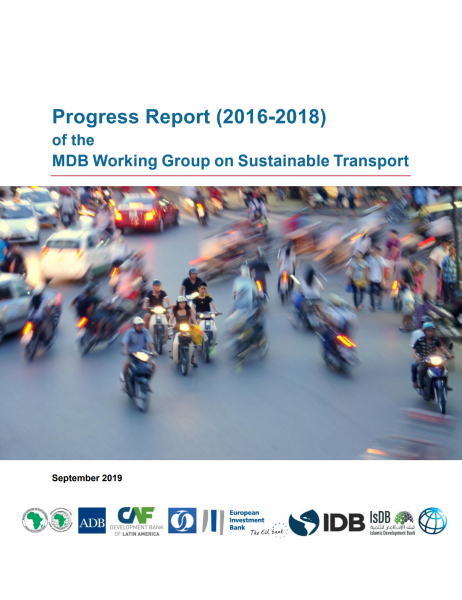
The Multilateral Development Banks (MDBs) have a target to provide more than USD 175 billion of loans and grants for transport in developing countries between 2012-2022. This target is included in the MDBs’ Joint Statement of 2012 that was made as the Commitment to Sustainable Transport during the United Nations Conference on Sustainable Development, also known as Rio 2012 or Rio+20. This report looks at the progress and achievements of the MDBs between 2016 and 2018. The information is presented in a visual approach summarizing the information in charts and graphics.
Find the report here.
Transport and Climate Change
2016-Critical Year for Climate Change
2016 was a critical year for climate change, as the need to translate the political consensus of COP21 into tangible steps toward implementation of the Paris Agreement has never been more urgent. With the rate of global temperature increase exceeding most climate models, with political shockwaves from the United States threatening to disrupt progress in pre- 2020 action on climate change, and with a pressing need for agreement on the rulebook for the Paris Agreement, COP22 in Marrakech had a high bar to clear for producing actionable outcomes.
Further action on Transport and Climate Change will benefit greatly from the “Marrakech Action Proclamation for our Climate and Sustainable Development” that was adopted by the Heads of State and Government meeting in Marrakech and that calls on “all non-state actors to join us for immediate and ambitious action and mobilization, building on their, important achievements” as well as the “Marrakech Partnership for Global Climate Action” (MPGCA) launched at COP22, which outlines a more sustained and meaningful engagement of non-State actors in the UNFCCC process.
Transport & Climate Change
Transport sector is responsible for 23% of the greenhouse gas emissions and any global attempt at limiting global average temperature rise to less than 2°C without including transport sector will not be successful. In alignment with its missions, the Partnership on Sustainable, Low Carbon Transport (SLoCaT) promotes the integration of sustainable transport in global policies on climate change. As a part of its work stream on transport and climate change, the SLoCaT Partnership is tracking climate negotiations from a transport perspective and since 2013 has been organizing annual Transport Day Events during COP meetings. The SLoCaT Partnership played a key role in bringing together transport commitments at the UN Secretary General’s Climate Summit in September 2014. In addition, SLoCaT Partnership monitored the negotiations during COP21 and COP22 and did so from a transport perspective. For more information on climate change related activities of the SLoCaT Partnership, please see following links:
- Paris Process on Mobility and Climate (PPMC)
- Tracking Transport @ UNFCCC Negotiations
- Transport Day 2016
- Transport Day 2015
- Transport Day 2014
- Transport Day 2013
- UN Secretary General’s Climate Summit
SLoCaT Transport GHG Emissions Database and Analyses
Under the PPMC Initiative, SLoCaT is creating a knowledge base to assist both internal and external partners (e.g. national ministries and international supporting entities) in defining transport targets and implementing mitigation strategies. This knowledge base is captured in a set of knowledge products that are designed to add value to existing UNFCCC reporting protocols by emphasizing transport-specific elements and incorporating expertise from funding agencies and research institutions.
The proposed knowledge base is divided into two primary areas: Transport Greenhouse Gas (GHG) Emissions-Related Databases, and Transport GHG Emissions Analysis and Reports, each of which are to be composed of a number of existing and forthcoming knowledge products. These knowledge products can be utilized individually or in combination to help achieve national transport mitigation objectives:
- Transport GHG Emissions Databases
- Transport GHG Emissions Analyses and Reports
- Transport GHG Emissions Research Briefs
A detailed outline and objectives of the existing and forthcoming knowledge products are presented in the GHG methodological note.
To guide the SLoCaT Partnership in its ongoing work on transport sector GHG analysis, it is intended to establish a review panel of external experts. The review panel can also play a role in recommending research directions after COP21. If you are interested to participate in the review panel, please contact Karl Peet at karl.peet@slocatpartnership.org.
